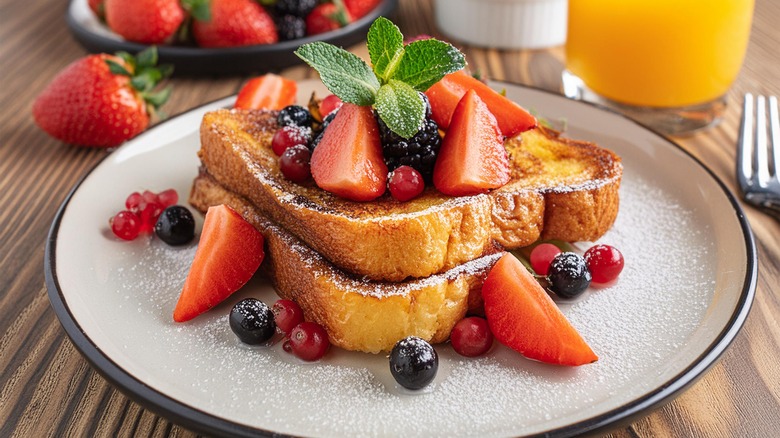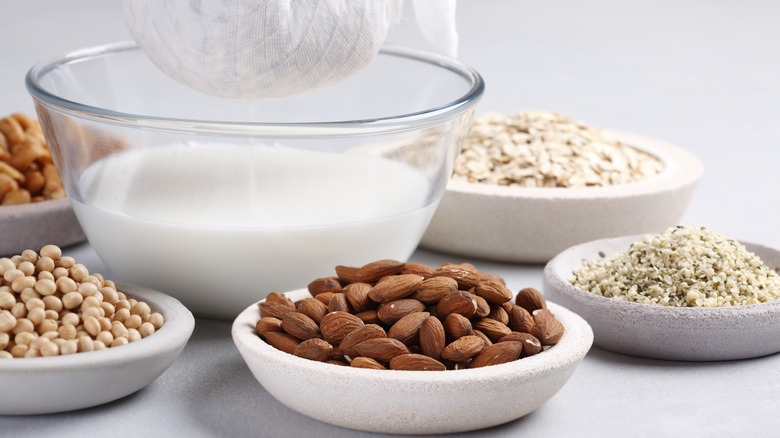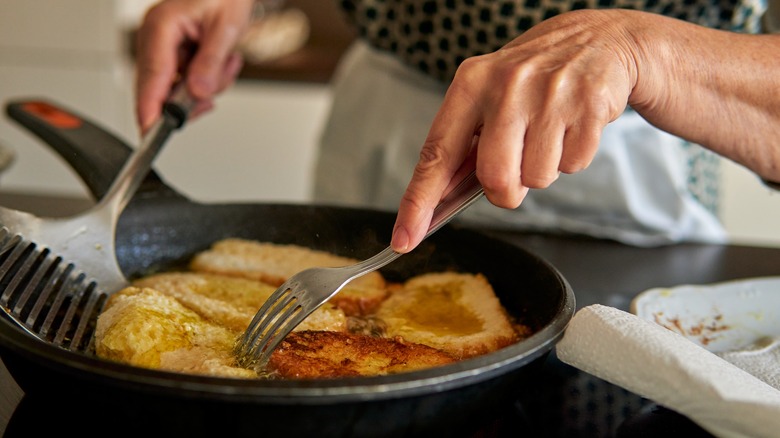How To Make French Toast If You Can't Eat Milk Or Eggs
French toast certainly holds a special place in the breakfast hall of fame, offering the perfectly sweet intersection between pancakes and toast. It's fluffy, rich, and drenched in sweet, golden syrup (although the best French Toast recipes don't even need syrup) — basically edible nostalgia. French toast relies on the magic of eggs to bind and give body, while milk adds creaminess. If you're allergic to dairy or you've decided to cut animal byproducts out of your diet, the idea of French toast may feel out of reach, but it doesn't have to be. You just have to get a little more creative.
If you're looking to veganize the traditional French toast recipe but don't know where to start, good news! You can easily craft a plant-based version of French toast that will rival the original, complete with crispy edges and a tender center. All you need are a few alternative ingredients. The Takeout recently had a chance to talk with Kyle Mendenhall, the senior director of culinary innovation at Snooze A.M. Eatery, who offered his expertise on the subject.
When following traditional French toast recipes, you'll be instructed to soak your bread in a batter consisting of eggs, milk, sugar, vanilla, and cinnamon. Mendenhall shared how he prefers using half-and-half in his batter for optimal richness that isn't too heavy, but finding a substitute for dairy in this recipe is simple. "For my wife (who is dairy-free), I like to use almond milk," Mendenhall told The Takeout. "This is a great substitute for half-and-half."
What egg and milk substitutes work best?
Plant-based milks are everywhere now, from almond and oat to coconut and soy. Plus, brands like Silk, Califia Farms, and Violife also sell dairy-free heavy creams. However, these products are not always easy to find in stores. Lucky for you, making your own homemade plant-based heavy cream is easy. All you need are some soaked cashews, water, salt, and a high-speed blender.
The eggs in French toast recipes act as a binder, and there aren't too many alternatives that replicate the thick, custardy texture of eggs, so replacing them requires a bit of strategy. To omit eggs in your recipe, Mendenhall verified that using half-and-half on its own will still produce the soft and fluffy results you desire, but if you're going for a fully plant-based version, you have a few different options.
"For some extra stability you can use a powdered egg replacer instead (just follow egg ratios on the package)," Mendenhall advised. Some good brands you can try are Bob's Red Mill Egg Replacer or Judee's Vegan Egg Replacer Powder. Chickpea flour or ground flaxseed and cornstarch will also act as binding ingredients when combined with liquid, offering a similarly egg-like batter in your French toast recipe. And the best part is, these ingredients are packed with protein and nutrients.
How to make plant-based French toast
Once you decide what your preferred method is, the recipe will call for a fairly similar step-by-step guide. Simply whisk together the non-dairy milk base, your choice of egg replacer, chickpea flour, or flaxseeds and cornstarch along with the sugar, vanilla extract, and cinnamon; which all happen to be vegan on their own. You'll then follow the traditional instructions of dipping your bread slices into the batter, making sure they're evenly coated but not overly soaked.
Place the coated bread slices onto a heated skillet, cooking each side for 3 to 4 minutes or until golden brown and crispy. Stack your French toast slices and top with your favorite add-ons like fresh berries, sliced bananas, and powdered sugar. Serve, and enjoy!
Eating dairy- and egg-free doesn't mean you have to give up on your comfort food favorites. Anyone can be a vegan chef and replicate their favorite recipes with the right tools and ingredients. You'll be surprised at how close this version tastes to the French toast you grew up with — only it's lighter and kinder to those with food sensitivities.


